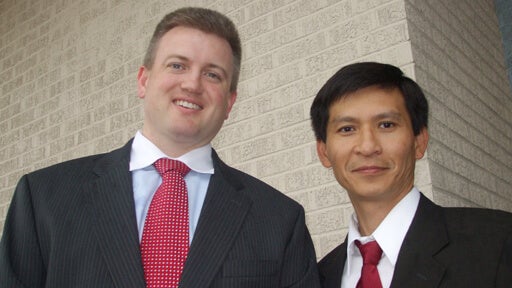Pastor Thomas Le lived under the communist regime in Vietnam as a child. Life under the communist government was hard, he said, because “you have been controlled physically, mentally, and emotionally, and worst of all, spiritually. They’ll tell you what to think, and how you should believe.”
Le said that his family experienced persecution until 1977. At that point, they sought refuge in Hong Kong, and his father made the decision to move the family to America. His father decided to go to America, Le said, “because it’s a place of freedom of religion, freedom of worship, and freedom [to] assemble.”
“And because I received so much blessing and opportunity here in America, God called me to become a minister,” Le continued. “And I started working with the Vietnamese refugees here.”
Le started Plano Vietnamese Baptist Church (PVBC) in 2003 with a small group of individuals including others who had also fled religious persecution in Vietnam.
When PVBC grew to approximately 50 members, Le and his congregation began looking for a new location. They eventually decided on a property near downtown Plano that had been used as both a church and a daycare in the past, and at the time was sitting unoccupied.
The City of Plano had a zoning ordinance that houses of worship in residential areas had to have a site with a minimum of two acres. The property PVBC wanted to buy was 1.2 acres.
Because of the two-acre ordinance, the congregation could not receive a bank loan for the building, Le said. Many members of the congregation drew from their own life savings in order to buy the property.
“So, this [was] a step that [took] a lot of sacrifice for us,” Le said, “especially people who came here empty-handed.”
PVBC followed all proper procedures to purchase the building. The church petitioned the City of Plano Board of Adjustment to make an exception to the city’s two-acre minimum site requirement for houses of worship in residential areas, which the Board had done for other churches in the past.
Despite a recommendation from city staff to approve the church’s request, and the fact that the building had been used as a church in the past, the Board of Adjustment denied the congregation a certificate of occupancy because the property did not meet the two-acre site requirement.
First Liberty represented Le and the congregation as they sought a variance to the city’s two-acre rule. On June 17, 2008, First Liberty filed a lawsuit against the city of Plano for enforcing the city’s discriminatory zoning ordinance, which applied only to houses of worship and discriminated against small churches.
On September 25, 2008, Texas State District Judge Greg Brewer ruled in favor of the church and overturned the decision of Plano’s Board of Adjustment. Judge Brewer found that the city’s denial of the variance was illegal and an abuse of discretion. As a result, Pastor Le and his congregation were able to hold services in their new building.
Discriminating against houses of worship is unconstitutional, and First Liberty is committed to defending the religious liberty rights of houses of worship of all faiths from unlawful zoning ordinances and government regulations.
First Liberty Institute is not currently providing additional content for this case. Please see the other tabs in this case for more information.
First Liberty Institute is not currently providing additional content for this case. Please see the other tabs in this case for more information.
